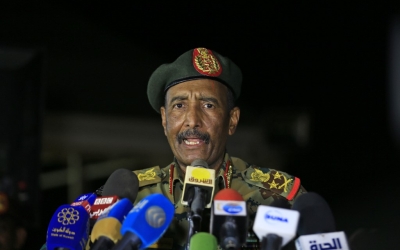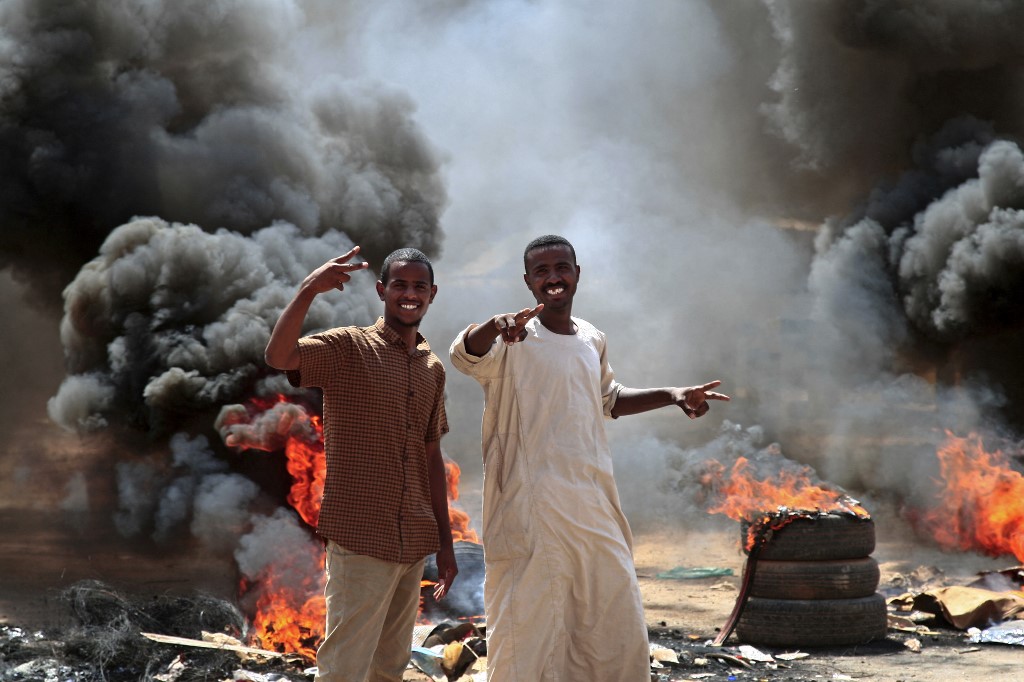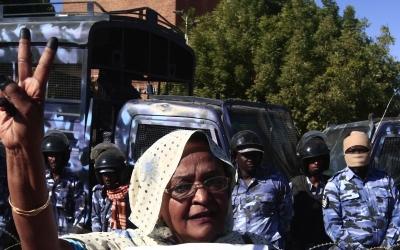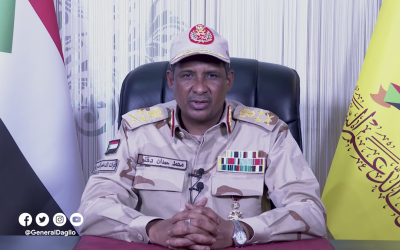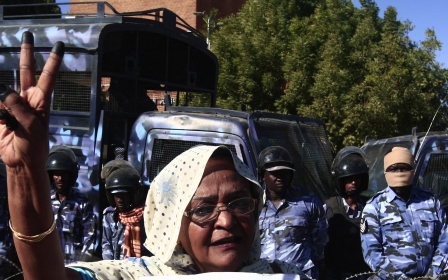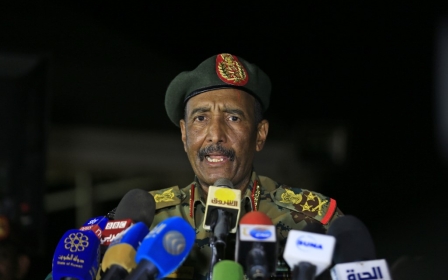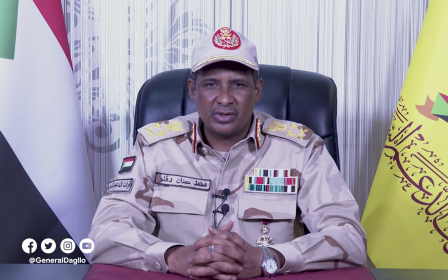Sudan coup: Could sanctions turn country into the next Yemen or Libya?
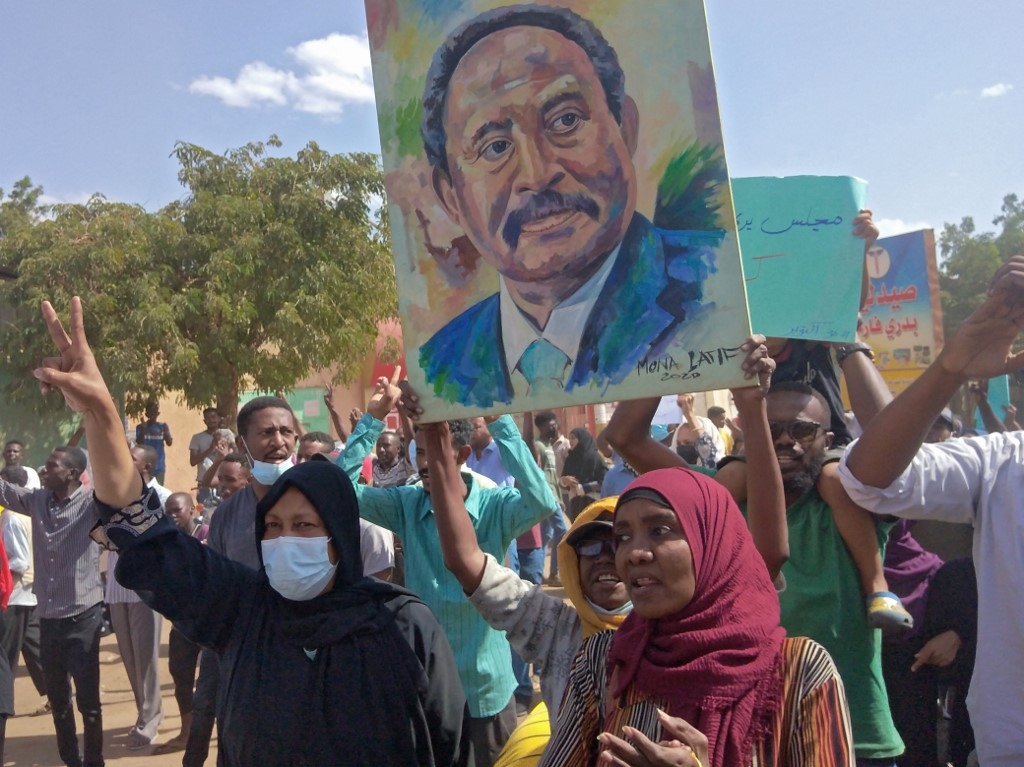
Sudanese political parties, syndicates and activists are split over the punitive measures imposed by the international community on Sudan following the 25 October coup, in particular whether more sanctions should be brought against the military leaders who led it.
Following the overthrow of Prime Minister Abdalla Hamdok's government by army chief Abdel Fattah al-Burhan, the US froze $700m in aid and demanded a return to a civilian-led transitional government.
The African Union also suspended Sudan from the bloc and the World Bank stopped $2bn in development grants to the country.
Earlier this month, a resolution was tabled in the US Congress condemning the coup and calling on the US Secretary of State to "immediately identify coup leaders, their accomplices, and enablers for consideration for targeted sanctions".
Some of those opposed to the coup see such moves as pressure that can help defeat the generals, while others are prepared to accept them with some provisos. A final section have looked upon the sanctions with suspicion, citing them as external interference in the country's affairs.
Some analysts have warned that such moves by the international community could create instability in the country akin to Iraq, Libya, Yemen and others, and leave Sudan at the mercy of competing regional and international players.
Many fear that it is not the military leaders, but ordinary Sudanese people, who will be hit by sanctions.
'Split the country'
Among those welcoming western intervention are the Forces for Freedom and Change (FFC), which helped lead the protests that led to the overthrow of longtime president Omar al-Bashir in April 2019.
El-Wathig al-Berair, a leading member in the FFC, stressed that the group strongly supports external pressure on the military as one of the main tools to end the coup.
“The FFC will use different kinds of escalation on the ground, and cooperation with the international community, to put pressure on the military to backdown from the coup," said Berair. "We won't accept any kind of talks with the coup leaders until the situation is back to that on 24 October.”
Another leading FFC member, who wished to remain anonymous, told MEE: “We are in full contact with different international institutions, along with government bodies in the United States, including Congress. So we are aware of the US movement to recognise Hamdok’s government and stand against any cabinet that would be appointed by the military ruler General Abdul Fattah al-Burhan.”
The source also said that the FFC wanted assurances that any recognition of the Hamdok government over the coup leaders would come with guarantees from Saudi Arabia, the United Arab Emirates and Egypt not to support the army.
“We are keen not to repeat the scenarios of the destabilisation of the country, such as Libya or Yemen, where there are two governments, that may split the country itself," he added.
International intervention unacceptable
Walid Ali, a spokesman for the Sudanese Professionals Association (SPA), which also helped spearhead the protest movement in 2019, told MEE: “We actually don’t recognise the military, or the FFC, and have nothing to do with what's called the international community.
“The SPA is only dependent on the Sudanese people and sticking with the demands of the revolution, not those of the international community, whether it's the US or anyone else.
“We will fight the military coup and bring back democracy ourselves, no one can do that but us."
Meanwhile, a leading member of the Communist Party, who also wished to remain anonymous, told MEE that any international intervention in the country was unacceptable and that the party would mobilise the people to stand against it.
“The Communist Party is against the military coup and asked its supporters to stand against it, but we prioritise the sovereignty of our country more than anything else," the source said.
"The international community won’t change the situation on the ground or the balance of power.”
'Targeted US sanctions'
Sudan's military has unsurprisingly rejected any kind of external intervention, stating they want to reconcile with the world but are keen to "correct the path" of the democratic transition.
“We are for equal cooperation with the world, and all our friends in the region, but we don’t accept international intervention that will try to impose anything on us,” a military source, who asked not to be named because he was not authorised to talk to the media, told MEE.
'The international community won’t change the situation on the ground or the balance of power'
- Sudanese Communist Party source
Former US diplomat Cameroon Hudson, now a fellow at the Atlantic Council, told MEE that he believed US sanctions would not negatively affect Sudanese citizens.
“Targeted US sanctions would only apply against individual generals and specific military-owned corporations," he said.
"The point is to target pressure on the military and impose a high cost on them personally for their actions, not on the Sudanese people.
“The international community wants to avoid a violent outcome above all else, but I fear that what we will be willing to accept is far less than what the Sudanese people are demanding.
"Ultimately, if the people are not satisfied by whatever deal gets cut, it will ultimately prove unsustainable. We cannot afford to continue to kick these big questions of the military’s role in the country down the road."
Road towards destabilisation
Khalid Altigani Alnur, a Sudanese political analyst, also warned that while the West's support of Hamdok would put pressure on the military, it could also put Sudan on the road to the kind of splits and destabilisation seen in Libya and Yemen.
Alnur told MEE that Sudan was already in a fragile state and that the coup had complicated the situation further.
He argued that while the majority of the Sudanese people were against the coup, opening the door to external interference would have a negative impact on the country.
“We have to see the region and the world around us and take the lessons from what is going on there," said Alnur.
"The international community is always prioritising security rather than justice or democracy in fragile countries like Sudan, so we shouldn’t be dependent on anyone except ourselves.
“We have to understand the game of international politics and how interests are moving all the time.
"So the dynamic of international policy is supporting Hamdok’s government now, but that won’t continue forever, especially as Burhan is trying to address the concerns and the interests of the West in Sudan, such as normalisation with Israel, and the implementation of economic policies among other reassurances.”
'Symptom of fundamental problems'
Khalid Saad, another Sudanese political analyst, also believes that while international pressure will help isolate military rulers, it will also push Sudan back to coming under regional and international influence.
“We know that Sudan was trying over the past two years to get out from the position of being under the influence of regional and international axes, but this coup will return us there again,” Saad told MEE.
“The intervention of the West will lead to the interventions of Russia and China who are close to the military, so this race will seriously affect the country as well. Don’t forget also the impact of neighbouring countries that the West are using to keep its influence in the country. We have to deal with this conflict of interest wisely in order to bring democracy back to our country, without losing our national sovereignty."
Hudson concludes that while reversing the coup might relieve some of the political pressure, it will not resolve the underlying issues that were undermining the transition.
“There is an effort to try to walk back this coup and return the transition to the path it was on, however that ignores the fact that the coup was merely the symptom of much more fundamental problems with the transition," he said.
Middle East Eye propose une couverture et une analyse indépendantes et incomparables du Moyen-Orient, de l’Afrique du Nord et d’autres régions du monde. Pour en savoir plus sur la reprise de ce contenu et les frais qui s’appliquent, veuillez remplir ce formulaire [en anglais]. Pour en savoir plus sur MEE, cliquez ici [en anglais].


